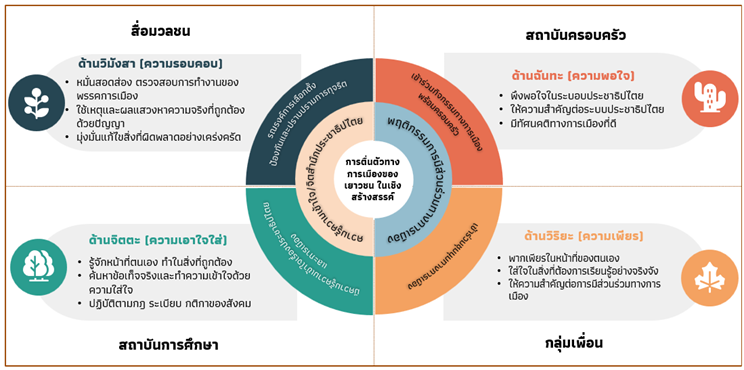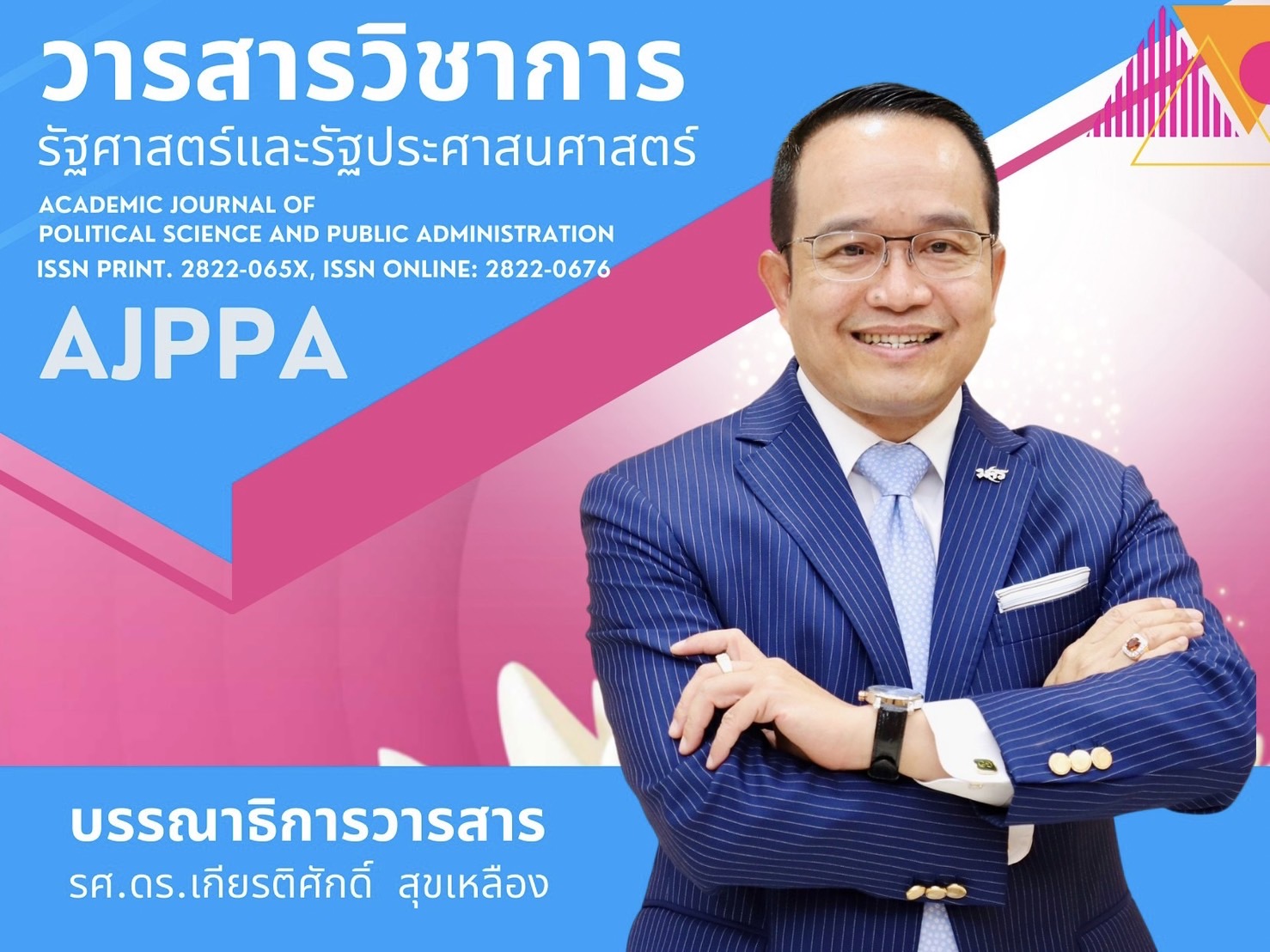การบูรณาการหลักธรรมเพื่อส่งเสริมการตื่นตัวทางการเมืองในเชิงสร้างสรรค์ ของเยาวชนในจังหวัดนนทบุรี
คำสำคัญ:
การตื่นตัวทางการเมือง, การกล่อมเกลาทางการเมือง, อิทธิบาท 4บทคัดย่อ
บทความวิจัยนี้มีวัตถุประสงค์เพื่อศึกษา 1. สภาพทั่วไปของการตื่นตัวทางการเมือง 2. ปัจจัยที่ส่งผลต่อการตื่นตัวทางการเมือง และ 3. บูรณาการหลักธรรมในการส่งเสริมการตื่นตัวทางการเมืองในเชิงสร้างสรรค์ของเยาวชนในจังหวัดนนทบุรี การวิจัยแบบผสานวิธี โดยการวิจัยเชิงคุณภาพ ผู้ให้ข้อมูลสำคัญจำนวน 20 รูปหรือคนแบ่งเป็น 4 กลุ่ม ได้แก่ นักวิชาการด้านพระพุทธศาสนา 5 รูปหรือคน นักวิชาการทางรัฐศาสตร์ 5 คน เยาวชน 5 คน และข้าราชการ นักการเมืองและนักปกครองท้องถิ่น 5 คน การวิจัยเชิงปริมาณ กลุ่มตัวอย่าง เยาวชนจาก 4 โรงเรียน ในจังหวัดนนทบุรี จำนวน 390 คน เครื่องมือที่ใช้ในการวิจัยคือ แบบสัมภาษณ์ และแบบสอบถาม ตรวจสอบข้อมูลด้วยการสนทนากลุ่มเฉพาะ
ผลการวิจัยพบว่า 1. สภาพทั่วไปของการตื่นตัวทางการเมืองของเยาวชนเกิดขึ้นได้จากความสนใจและการมีส่วนร่วมทางการเมือง และสามารถเปลี่ยนแปลงได้ตามสภาพแวดล้อมหรือสิ่งเร้าใหม่ ๆ การตื่นตัวทางการเมืองของเยาวชนซึ่งได้มาจากสถาบันครอบครัว กลุ่มเพื่อนและชุมชน สถาบันการศึกษา สถาบันสื่อมวลชนและสถาบันทางการเมือง 2. ปัจจัยกล่อมเกลาทางการเมืองโดยภาพรวมอยู่ในระดับมาก ( = 3.59) และเยาวชนมีการใช้หลักอิทธิบาท 4 ในระดับมาก (
= 3.70) และเยาวชนตื่นตัวทางการเมืองอยู่ในระดับมาก (
= 4.15) ปัจจัยการกล่อมเกลาทางการเมือง (X1) และหลักอิทธิบาท 4 (X2) มีอิทธิพลต่อการตื่นตัวทางการเมืองของเยาวชน (Y) ร้อยละ 37.7 3. การบูรณาการหลักอิทธิบาท 4 ในการส่งเสริมการตื่นตัวทางการเมืองในเชิงสร้างสรรค์ของเยาวชนในจังหวัดนนทบุรี ต้องส่งเสริมให้เยาวชนมีความรู้ความเข้าใจ และมีพฤติกรรมการมีส่วนร่วมทางการเมือง โดยอาศัยการสนับสนุนจากสถาบันครอบครัว กลุ่มเพื่อน สถาบันการศึกษา และสื่อมวลชน มีทัศนคติทางการเมืองที่ดี (ฉันทะ) มีความพากเพียรในหน้าที่ ใส่ใจเรียนรู้และเข้าร่วมกิจกรรมทางการเมือง (วิริยะ) ทำในสิ่งที่ถูก ค้นหาข้อเท็จจริง ปฏิบัติตามกฎกติกาของสังคม (จิตตะ) และหมั่นตรวจสอบการทำงานของพรรคการเมือง มุ่งมั่นแก้ไขความผิดพลาดอย่างเคร่งครัด (วิมังสา)
เอกสารอ้างอิง
ทัศนีย์ ทองสว่าง (2557). สังคมไทย. กรุงเทพฯ: โอเดียนสโตร์.
ธเนศ วงศ์ยานนาวา. (2546). รวมบทความเพื่อเป็นเกียรติแก่ ระดม วงษ์น้อย. รัฐศาสตร์สาร, 24(พิเศษ), 28-31.
พระบุญเพ็ง สิทธิวงษา. (2562). การใช้หลักอิทธิบาท 4 ในการบริหารจัดการท้องถิ่นของบุคลากรองค์การบริหารส่วนตำบลสีออ อำเภอกุมภวาปี จังหวัดอุดรธานี. วารสารมหาจุฬานาครทรรศน์, 6(5), 24-34.
พระมหาบรรจง ติสรโณ (ศรีสุข). (2560). ศึกษาการประยุกต์ใช้หลักอิทธิบาทธรรม 4 ในการจัดการเรียนการสอนของโรงเรียนปริยัติคุณรสวิทยา อำเภอเมืองสุรินทร์ จังหวัดสุรินทร์. วารสารมหาจุฬานาครทรรศน์, 4(7), 50-61.
พัชรี ศิลารัตน์. (2557). การใช้หลักอิทธิบาท 4 ในการส่งเสริมความรู้ความเข้าใจในระบอบประชาธิปไตยของเยาวชนเทศบาลเมืองร้อยเอ็ด พ.ศ. 2556. วารสารสถาบันวิจัยญาณสังวร, 5(2), 31-37.
พุทธทาสภิกขุ (เงื้อม อินฺทปญฺโญ). (2542). บางแง่มุมของกามในทัศนะพุทธทาสภิกขุ. กรุงเทพฯ: สำนักพิมพ์สุขภาพใจ.
ไพฑูรย์ สินลารัตน์. (2554). ความรู้คู่คุณธรรม (พิมพ์ครั้งที่ 3). กรุงเทพฯ: โรงพิมพ์จุฬาลงกรณ์มหาวิทยาลัย.
วัฒนา เซ่งไพเราะ. (2555). ความตื่นตัวทางการเมืองของเยาวชนในสถาบันการศึกษาในเขตกรุงเทพมหานครกับการพัฒนาวัฒนธรรมทางการเมืองแบบประชาธิปไตยช่วงปี พ.ศ. 2549-2554 (ดุษฎีนิพนธ์ปรัชญาดุษฎีบัณฑิต สาขาสื่อสารการเมือง), กรุงเทพฯ: มหาวิทยาลัยเกริก.
วัลลภ รัฐฉัตรานนท์ และนพพล อัคฮาด. (2562). ความสัมพันธ์เชิงสาเหตุระหว่างการตื่นตัวทางการเมืองกับความรู้สึกมีสมรรถนะทางการเมืองแบบประชาธิปไตยของนิสิตนักศึกษาในระดับปริญญาตรีของมหาวิทยาลัยในเขตกรุงเทพฯและปริมณฑล. วารสารการบริหารปกครอง, 8(1), 35-37.
สุชาติ ศรีสุวรรณ. (2546, 11 มิถุนายน). เหตุของปัญหาวัยรุ่น. มติชน, น. 15.
อุทิษา ภิญโญทรัพย์. (2557). การเสริมสร้างความตื่นตัวทางการเมืองของเยาวชนอายุ 18 - 19 ปีกรณีศึกษาเทศบาลตำบลบ้านเพชรภูเขียว อำเภอภูเขียว จังหวัดชัยภูมิ. รายงานสืบเนื่องการประชุมวิชาการและเสนอผลงานวิจัยระดับชาติและระดับนานาชาติ ครั้งที่ 2/2557 Proceeding, The 2rd CASNIC 2014. ขอนแก่น: วิทยาลัยบัณฑิตเอเซีย.
Taro Yamane. (1973). Statistics: An Introductory Analysis. (3rd Ed). NewYork: Harper and Row Publications.

ดาวน์โหลด
เผยแพร่แล้ว
รูปแบบการอ้างอิง
ฉบับ
ประเภทบทความ
สัญญาอนุญาต
ลิขสิทธิ์ (c) 2024 วารสารวิชาการรัฐศาสตร์และรัฐประศาสนศาสตร์

อนุญาตภายใต้เงื่อนไข Creative Commons Attribution-NonCommercial-NoDerivatives 4.0 International License.




